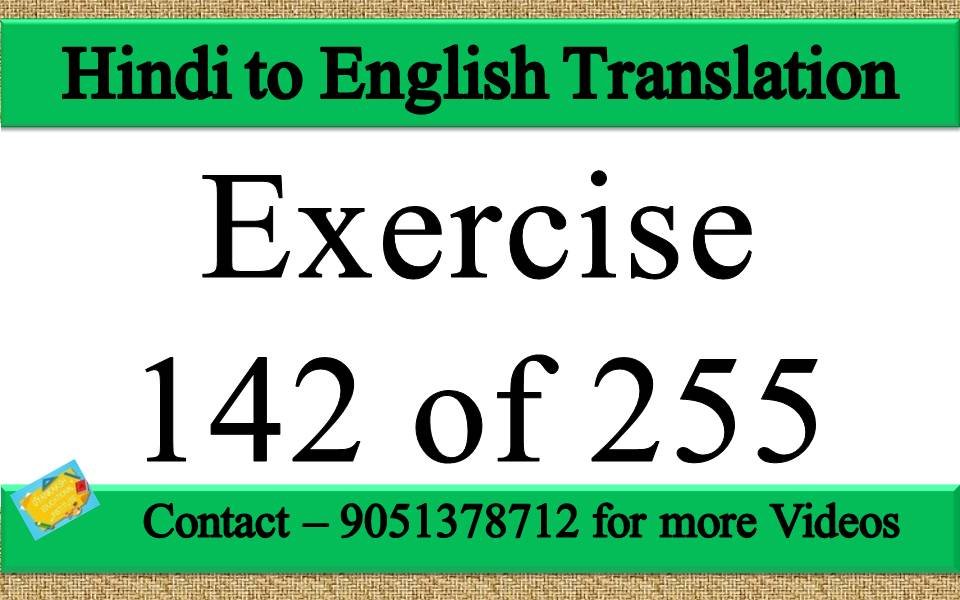"Mastering Translation: Unleash Your Skills with Hindi to English Translation Exercise 142"
Hindi to English Translation Course में आपका स्वागत है। इस Course में हम आपको 255 Exercises Solve करवाएंगे। अगर आप सभी Hindi to English Translation Exercise Solve करना चाहते है तो 9051378712 में सम्पर्क करें।
We have given you 255 classes on Hindi to English Translation Exercises. This is Hindi to English translation Exercise 142. You should watch the YouTube video first and then practice the sets given below. If you want proper improvement then practice by writing these sets in your copy and then study them regulary.
In every practice set you will get many examples on Hindi to English Translation Exercises with exercises, vocabulary and explanation.
We have given many course on Spoken English in our website. You can get them from the menu section.
Table of Contents (Hindi to English translation)
Hindi to English Translation Exercise 142 of 255
Do into English:
चार बजा है।
साढ़े पाँच बजा है।
सवा सात बजा है।
पौने नौ बजा है।
आठ बजने में पाँच मिनट बाकी है।
नौ बजकर पाँच मिनट हुआ है।
सुबह का समय है।
संध्या का समय था।
सन् 1996 का वर्ष था।
जनवरी का महीना था।
अभी तीसरा पहर है।
आधी रात का समय था।
आज बहुत गर्मी है।
कल बहुत सुहावना मौसम था।
राजस्थान में बहुत गर्मी पड़ती है।
कश्मीर में बहुत ठंडक रहती है।
ग्रीष्म ऋतु है। वसंत ऋतु थी।
जाड़े का मौसम है।
आज पहली जुलाई है।
वर्षा ऋतु है।
चाँदनी रात थी।
गोधूलि बेला है।
गर्मी का मौसम था।
वहाँ बहुत गर्मी पड़ती है।
ज़ोरों से वर्षा हो रही थी।
बर्फ गिरती है।
बर्फ गिर रही है।
हवा बह रही है।
झींसी पड़ रही थी।
बादल गरज रहे थे।
बिजली चमक रही है।
वर्षा होगी। बर्फ गिरेगी।
बादल गरजेंगे।
Download our Mobile App from Google Play Store – Gyankaksh Educational Institute.
Vocabulary for Hindi to English Translation Exercise 142 of 255:
तीसरा पहर – afternoon,
आधी रात – midnight,
सुहावना – pleasant,
मौसम – weather,
वसंतकाल – spring,
जाड़ा – winter,
वर्षाऋतु – rainy season,
चाँदनी रात – moonlit night,
गोधूलि बेला – twilight,
बर्फ गिरना – to snow,
झीसी पड़ना – to drizzle.
Spoken English Course (Beginner level to advance level) 2500+ Videos
13. Use of Introductory ‘It’
आप जानते हैं कि ‘It’ एक Pronoun (सर्वनाम) है जिसका व्यवहार निर्जीव वस्तुओं, अत्यंत छोटे सजीवों (जैसे: कीड़े – मकोड़े), पशु – पक्षियों और बहुत छोटे बच्चों के लिए किया जाता है। जैसे:
यह (एक) मेज़ है। | It is a table. It’s a table.
|
यह (एक) बिल्ली है। | It is a cat. It’s a cat.
|
यह (एक) लड़का है या (एक) लड़की? | Is it a boy or a girl? |
Introductory ‘It’ का व्यवहार दिन / तिथि / महीना / साल / ऋतु / मौसम / प्राकृतिक घटना / समय इत्यादि बताने के लिए किया जाता है।
A. दिन / तिथि / महीना / साल / ऋतु / मौसम इत्यादि बताने के लिए:
1. गुरुवार था। गुरुवार का दिन था। | It was Thursday.
|
2. दिसंबर था। दिसंबर का महीना था। | It was December.
|
3. सन् 2019 था। सन् 2019 का साल था। | It was 2019.
|
4. ग्रीष्म ऋतु थी। गर्मी का मौसम था। | It was summer.
|
5. शीत ऋतु थी। जाड़े का मौसम था। | It was winter.
|
6. वर्षा ऋतु थी। बरसात का मौसम था। | It was rainy season.
|
7. वसंत ऋतु थी। वसंत का मौसम था। | It was spring.
|
8. आज बुधवार है। आज बुधवार का दिन है। | It is Wednesday today. It’s Wednesday today.
|
9. आज पहली जनवरी है। आज पहली जनवरी का दिन है। | It is the first of January today. It’s the first of January today.
|
10. आज बहुत गर्मी है। | It is very hot today. It’s very hot today.
|
11. कल बहुत गर्मी थी। | It was very hot yesterday.
|
12. आज सुहावना मौसम है। | It is a pleasant weather today. It’s a pleasant weather today. |
B. प्राकृतिक घटनाएँ बताने के लिए:
1. वर्षा होती है। | It rains.
|
2. वर्षा हो रही है। | It is raining. It’s raining.
|
3. ज़ोरों से वर्षा हो रही है। | It is raining heavily. It’s raining heavily.
|
4. झीसी पड़ रही है। बूंदा – बाँदी हो रही है। रिमझिम वर्षा हो रही है। | It is drizzling. It’s drizzling.
|
5. बादल गरजते हैं। | It thunders.
|
6. बादल गरज रहे है। | It is thundering. It’s thundering.
|
7. बिजली चमक रही थी। | It was lightning.
|
8. हवा बह रही थी। | It was blowing.
|
9. ज़ोरों से हवा बह रही थी। | It was blowing hard.
|
10. हिमपात हो रहा था। बर्फ गिर रही थी। ओले पड़ रहे थे। | It was snowing.
|
11. अंधेरी रात थी। | It was a dark night.
|
12. चाँदनी रात थी। | It was a moonlit night.
|
13. चेन्नई में बहुत गर्मी पड़ती है। | It is very hot in Chennai. It’s very hot in Chennai.
|
14. शिमला में बहुत ठंड पड़ती है। | It is very cold in Shimla. It’s very cold in Shimla. |
C. समय की भिन्न – भिन्न घड़ियाँ बताने के लिए:
1. पाँच बजा है। | It is five (o’clock). It’s five (o’clock).
|
2. पाँच बजने ही वाला है। | It is just on five. It’s just on five.
|
3. साढ़े पाँच बजा है। | It is half past five. It’s half past five.
|
4. सवा पाँच बजा है। | It is a quarter past five. It’s a quarter past five.
|
5. पौने पाँच बजा है। | It is a quarter to five. Its a quarter to five.
|
6. पाँच बजने में पाँच मिनट बाकी है। | It is five (minutes) to five. It’s five (minutes) to five.
|
7. पाँच बजकर पाँच मिनट हुआ है। | It is five (minutes) past five. It’s five (minutes) past five.
|
8. संध्या है। संध्या का समय है। | It is evening. It’s evening.
|
9. अभी संध्या है। अभी संध्या का समय है। | It is evening now. It’s evening now.
|
10. दोपहर का समय था। | It was noon. |
ऊपर के हिंदी वाक्यों में समयबोधक शब्द ही वाक्य में कर्ता हैं। ऐसे वाक्यों के अंग्रेज़ी अनुवाद में Introductory ‘It’ का व्यवहार होता है।
ऊपर के अंग्रेज़ी वाक्यों में to का अर्थ है – कम या बाकी और past का अर्थ है बजकर।
Thank you for watching Hindi to English translation Exercise 142 of Hindi to English Translation Exercises. Please give us your feedback in the comment section below. We would love to know about your thoughts on our content. Feel free to share your thoughts with us in the comment section. Moreover, you can give us your valuable suggestions or advice for improving our content.
We would love to read your comments. Thank you!
If you liked this article of Hindi to English translation Exercise 142, then please share it with your friends and relatives on WhatsApp, Facebook, etc.
Thank you!
Raghunath Sir!


